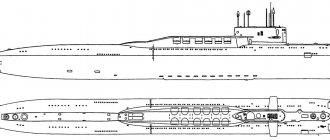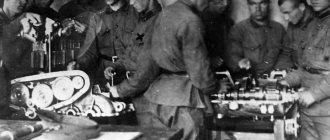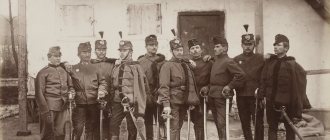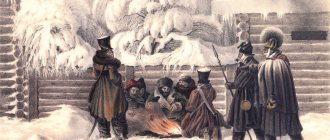Generalissimo of the Soviet Union
- the highest military rank in the Armed Forces of the USSR. Introduced by the Decree of the Presidium of the Supreme Soviet of the USSR dated June 26, 1945 on the basis of consideration of a collective petition of workers, engineers and technical workers and Moscow employees dated February 6, 1943 and a note from the commanders of the front troops, the General Staff of the Red Army, and the Navy dated June 24, 1945 .
The next day, June 27, at the proposal of the Politburo of the Central Committee of the All-Union Communist Party of Bolsheviks and the written submission of the front commanders, the title was awarded to I.V. Stalin “in commemoration of exceptional merits in the Great Patriotic War.” In addition, he was awarded the Order of Victory and was given the title of Hero of the Soviet Union.
Generalissimos of Russian history
The word generalissimo can be translated from Latin as “most important” or “most important.” In many countries in Europe and later Asia, this rank was used as the highest military rank. The generalissimo was not always a great commander, and the best of them won their greatest victories before gaining a high-profile position.
In the history of Russia, five commanders were awarded this highest military rank:
- Alexey Semenovich Shein (1696).
- Alexander Danilovich Menshikov (1727).
- Anton Ulrich of Brunswick (1740).
- Alexander Vasilyevich Suvorov (1799).
- Joseph Vissarionovich Stalin (1945).
What does the word general mean?
The rank or rank of the highest command and control personnel in the army, as well as the person holding this rank. Major General is the first senior general rank.
Interesting materials:
How to loosen a wide elastic band? How to leave a review on Google Maps? How to leave a link to Twitter on Instagram? How to cool the kettle to 80 degrees? How to lighten the background in Word? How to refresh oranges? How to freshen a coat without washing? How to refresh spoiled meat? How to refresh wilted green onions? How to refresh wilted dill?
Who was the first?
Alexey Semenovich Shein in historical literature is most often called the first generalissimo in the history of our country. This man lived a short life and was one of the associates of Peter I at the beginning of his achievements.
Alexey Shein came from a noble boyar family. His great-grandfather, Mikhail Shein, was a hero of the defense of Smolensk during the Time of Troubles, and his father died during the war with Poland in 1657. Alexey Semenovich began serving in the Kremlin. He served as a steward under Tsarevich Alexei Alekseevich, then as a sleeping steward for the Tsar himself.
In 1679-1681 A.S. Shein was a governor in Tobolsk. Under his leadership, the city, which had burned down in a fire, was rebuilt. In 1682, Alexey Semenovich received the rank of boyar. In 1687, the boyar took part in the Crimean campaign, and in 1695 - the first campaign against Azov.
In 1696, he led Russian troops during the second campaign against the Azov fortress. It was then that A.S. Shein received the title “Generalissimo”, unusual for Russia. However, researchers of his biography N.N. Sakhnovsky and V.N. Tomenko questioned this fact. In their opinion, the tsar ordered Shein to be called generalissimo only during the campaign, and the name indicated only the powers of Alexei Semenovich as commander-in-chief of the ground forces. After the end of the campaign against Azov A.S. Shein did not retain the title of Generalissimo, given to him during the fighting. If we accept this point of view, A.D. should be recognized as the first generalissimo. Menshikov.
Alexander Menshikov went down in history as the closest ally of the first Emperor of Russia and one of the greatest commanders of his time. He took a direct part in the military transformations of Peter I, starting with the amusing troops. And in 1706, he defeated the Swedes in the Battle of Kalisz, and participated as one of the military leaders in the victorious battles of Lesnaya and Poltava. For his military services, Alexander Menshikov rose to the rank of president of the Military Collegium and field marshal.
For the first time, the commander tried to claim the highest military rank during the reign of Catherine I, when he had exclusive power. He was able to receive the rank of generalissimo under her successor Peter II, when he still had influence on the tsar.
The Saxon ambassador Lefort recalled the staging of this action. The young emperor entered the chambers of his Serene Highness and, with the words “I destroyed the field marshal,” handed him a decree appointing him generalissimo. At this time, the Russian Empire did not wage wars, and the prince did not have the opportunity to command armies in his new capacity.
The conferment of military rank was one of a whole series of awards that rained down on His Serene Highness the Prince and his family that year. The most important thing was the betrothal of his daughter to the emperor. But already in September 1727, Menshikov lost the fight for the monarch’s favor and lost all awards and ranks, including the title of generalissimo. The following year, Peter I's comrade-in-arms was exiled to Berezova, where he died in November 1729.
How Stalin became a generalissimo
Before starting a detailed conversation about how Stalin received this title and how he treated it, let us recall that in world practice, as a rule, it was awarded not to generals, but rather to the most significant statesmen, those who led not only the army, but and the entire belligerent power as a whole.
However, in Russia everything was different. Stalin was the only Soviet generalissimo, the fifth person on Russian soil with such a title. The fourth was the deeply revered Supreme Commander Alexander Suvorov. There is a lot of evidence that Joseph Vissarionovich fought off such an honor as best he could. The highest military rank, Generalissimo of the Soviet Union, was awarded to him as the Supreme Commander-in-Chief of the Armed Forces of the USSR by Decree of the Presidium of the Supreme Soviet of the Soviet Union on June 27, 1945. However, according to available data, the first attempts to do this began in early 1943.
In any case, the archives allegedly contain a coded telegram in which several famous commanders of the Great Patriotic War address comrades Malenkov, Molotov and Beria with a similar proposal. Then the “voice of the people” could not be avoided - a group of workers, engineers and technical workers and employees of the Moscow city made a proposal to confer the highest rank on Stalin.
However, until the end of the Great Patriotic War, the Supreme Commander did not want to hear about anything like that. He became a marshal six months later than Zhukov, the 11th in the USSR, and not the first. Moreover, such attempts generally aroused the most negative emotions in the leader, sometimes driving him almost to the point of white heat. One of his authentic monologues specifically on this topic has been preserved, cited by a more than trustworthy witness, Marshal Konev, in which Stalin curses at the fact that they are trying to put Generalissimos Franco and Chiang Kai-shek “into his company”, and also “they want to put from marshals to some generalissimos." At the same time, the following phrase was also heard: “You need titles for authority, not Comrade Stalin!” The “initiative” of well-wishers from “Ressora” and similar messages from the front invariably bear a resolution written in the Supreme’s favorite red pencil: “To the archives!” Joseph Vissarionovich was categorically not going to give them a go and put them into practice.
According to one version, they managed to “persuade” him during an impromptu banquet held on June 24, 1945 after the Victory Parade in a tiny hall near the Mausoleum, where the country’s leaders usually hid from the weather during festive events, but then, on a wave of emotions that gripped everyone, they decided to celebrate whipped up the greatest event. Some researchers are trying to argue that it was amid this feast in a narrow circle that the Supreme Commander gave in, agreeing to the second Order of Victory, the title of Hero and, yes, Generalissimo.
Hence, they say, such “super-efficiency” with the introduction of this title by the Supreme Council and its assignment to Stalin. Let me doubt it. Stalin simply swore at those who subsequently tried to present him with the Star of the Hero with all his heart. And I have never worn it once in my life. As, by the way, was the generalissimo’s uniform, an attempt to present it to him for approval almost ended tragically for all participants. Seeing the completely phantasmagoric attire put on the chief quartermaster of the Red Army Pavel Drachev for the presentation with epaulettes instead of shoulder straps, on which the coat of arms of the USSR was displayed, and with gold stripes, the supreme asked only one question: “Who exactly are you going to dress in this?!” This was said in such a tone that the topic was closed by itself once and for all. Until the end of his life, Stalin wore a marshal's uniform, and he left this world in it.
The version of Joseph Vissarionovich’s acceptance of the title of generalissimo seems extremely similar to the truth, according to which his associates, desperate to “take away” the leader, turned to Stalin’s favorite commander, Marshal Rokossovsky, for help. And he, taking advantage of the moment, dared to “let the hairpin go”: “Like, what is this, Comrade Supreme? You are a marshal, so I am a marshal! If something happens, to be honest, according to the regulations, you won’t be able to punish me...”
Of course, only Konstantin Konstantinovich could afford such a thing. To anyone else, perhaps, Joseph Vissarionovich would have quickly explained what he can and cannot do. And then he simply waved his hand - do whatever you want. In the end, it was 1945, the greatest war in the history of mankind was won, the country was saved. He had every right! We always remember and honor the Marshals of Victory, and let us not forget about its generalissimo.
Anton Ulrich of Brunswick
Anton Ulrich was the second son of the Duke of Brunswick and nephew of the famous King Frederick II. In 1733 he was summoned to Russia, and a few years later became the husband of Anna Leopoldovna, niece of the Empress of Russia.
In 1740, after the death of Empress Anna Ioannovna, Anton Ulrich's young son became emperor. A temporary worker from the previous reign, Biron became regent under the infant ruler, and Anton Ulrich was actually removed from making serious government decisions.
Biron feared for his position and, fearing a conspiracy, subjected the emperor's father to public interrogation. Anton Ulrich was forced to admit that he wanted to remove the temporary worker from power. Then Biron pointedly offered the highest dignitaries a choice between the prince and himself, and they preferred the current regent. Head of the Secret Chancellery A.I. Ushakov threatened the emperor’s father that, if necessary, he would treat him like any other subject. After this, Anton Ulrich lost all military positions.
On November 7, 1740, Field Marshal Minich organized a coup and arrested Biron. Contemporaries wrote that Minich, who had previously supported the regent, hoped to receive the rank of generalissimo. But under the new regime, the best Russian commander of his time again did not receive the highest military rank.
Two days later, on November 9, a new manifesto was released on behalf of Ivan Antonovich. It reported that Biron had been removed, inter alia, for the insults and threats he made to the emperor’s father. The powers of the regent were received by Anton Ulrich's wife, Anna Leopoldovna, and the German prince himself was declared co-ruler and generalissimo.
Anton Ulrich remained Generalissimo until the next palace coup, which brought Empress Elizabeth to power. During the year he was in the highest rank, the prince did nothing. He only quarreled with Minikh, who was counting on this rank himself and later retired.
After the coup on November 25, 1741, Anton Ulrich lost all his ranks and found himself in the position of a hostage. He lived with his wife and children in the northern provinces of the country. In 1744 he was separated from his son, the emperor, and transferred to live in Kholmogory. In 1746, his wife died, and he and his remaining children continued to live as an exile. In 1774, the old and blind former generalissimo died. A few years later, Empress Catherine allowed his children to leave Russia and provided them with an allowance.
Generalissimo Suvorov - award to the greatest commander
Alexander Vasilyevich Suvorov became famous as the greatest Russian commander of his time and one of the greatest in Russian history. During his long military career, he successfully fought against the rebel Poles, the Ottoman Empire, and revolutionary France. He received the highest military rank less than a year before his death, after his last military campaign.
In November 1799, after completing the difficult Swiss campaign, Alexander Suvorov was awarded the highest military rank by the Emperor of Russia as a reward for his service and leadership skills. From now on, the military board had to send messages to the commander not decrees.
The Generalissimo withdrew his troops from Switzerland by order of the emperor and returned with them to Russia. When the army was on Polish territory, Suvorov went forward to the capital. Along the way, the Generalissimo fell ill and went to his estate. His condition changed for the better, then worsened. And in May 1800, Generalissimo Alexander Suvorov died.








